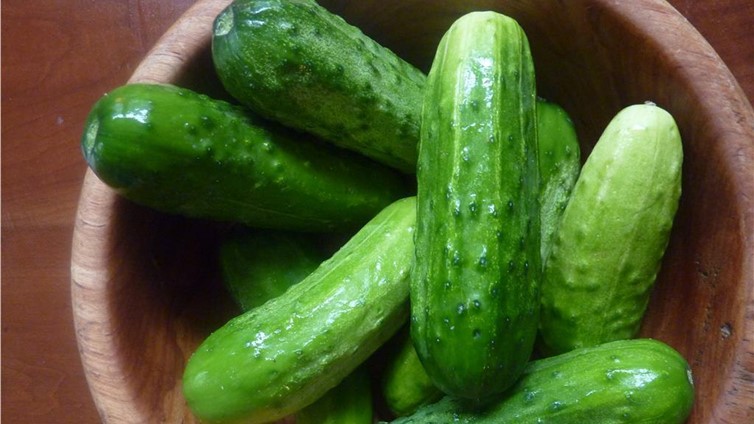Dogs love human foods.
If you are a dog owner already you know just how fast dogs are to run to you when food is offered.
Sometimes you don’t even have to call them.
In most cases, they will just hear a bag opening up and they will be fast to run to you even if they are in another room. They are so big foodies.
They may love food, and they do have those adorable puppy eyes that simply stare at you as if they’re saying – Please, can I have a bite? – but the truth is that dogs shouldn’t try everything.
Yes, some human foods are safe and delicious and should be shared with dogs in moderation, and as an occasional snack.
Bear in mind that even if something is OK to share with your dog, you should only serve it in moderation.
For example, a cucumber is a safe food to share with your Fido. In fact, cucumber is a great summer treat when served in moderation.
However, if you let your dog eat an enormous amount of cucumber you can expect him to experience some stomach issues followed by diarrhea.
To avoid this and many other problems share safe human foods only in moderation, and as an occasional treat.
Now, you may often hear (especially experienced dog owners) talking about salty food as a big no-no for dogs.
No matter how a small amount of salt there might be you will always hear – this isn’t good for dogs. The same applies to canned fruits, industrial food, and even sugary drinks.
All in all, excess salt and any type of salty foods are not recommended for dogs. Read on to discover more on salt poisoning.
Is Salt Bad For Dogs?
Simply said, yes. No matter how much you love salt, you should never serve your dog food that is rich in salt.
Dogs do ingest salt but through their food. They ingest sodium which is essential for a healthy mind and body. However, they do this through dog food, commercial dog food to be precise.
Do they ingest sodium if you let them jump into the ocean or spend an entire day at the beach? Simply said, yes.
A nice trip to the beach with your dog is always packed with many dangerous moments, so make sure that you know how to keep a dog safe while catching that wave.
Know that saltwater poisoning is real, that it comes with many challenges, and that it is especially dangerous to dogs who have kidney issues already.
Now, let’s explain why salt is bad for dogs.
Is Salt Safe For Dogs To Eat?
When it comes to keeping a dog’s fluid levels in balance, sodium plays a crucial role.
Salt is needed in a dog’s regular and daily diet, but not in the form that humans ingest it.
Plus, too much salt can be fatal to dogs. This is why salt usage, in general, leads to strong confusion.
If you read articles such as ‘Can dogs eat popcorn‘ you may notice lines saying ‘make sure that popcorn are unsalted!’ This is why misinformation comes into play.
Let’s elaborate on this further.
Salt And Sodium
We all know that salt is in everything that we eat.
High levels of salt are not healthy even for humans, so you need to be extra careful when it comes to dogs’ salt intake.
To understand why sodium is included in dog commercial food you need to understand the link between sodium and salt first and why these two actually stand for different things.
Salt is sodium chloride, a crystal-like compound found in nature. On the other hand, sodium is a dietary mineral found in salt.
Both are needed in dogs’ daily diets but in specific amounts. How do dogs react to sodium and salt? When dogs ingest sodium it turns into ions inside their bodies.
As you may know already, ions are responsible for regulating fluid levels, blood pressure, and blood volume.
If dogs don’t have enough salt or sodium in their bodies they may experience hyponatremia.
This condition occurs when dogs lose fluids via vomiting or diarrhea and become heavily lethargic.
On the other hand, if a dog consumes too much salt, salt poisoning will occur.
What Is Salt Poisoning In Dogs?
Dogs can suffer from salt poisoning. If they consume too much salt in a short period of time it can lead to salt poisoning.
The biggest reason why salt poisoning is so devastating for dogs is that there is no specific treatment for it. There are certain methods that veterinarians often use.
These methods are based on balancing bodily fluids and preventing further problems.
According to AKC source, half of the dogs with toxic levels of sodium in their blood do not survive, even with treatment.
If your dog accidentally eats a huge amount of salt or eats a whole bag of chips, make sure that you monitor him closely.
What you need to do is to monitor him for any sign of salt poisoning.
In most cases, salt poisoning symptoms will start with vomiting and/or drinking large amounts of water. The next phase should include strong tiredness and a swollen stomach.
If your Fido has had a significant amount of salt he will become very stiff, because his muscles have lost moisture.
Other symptoms may include:
- Diarrhea
- Swelling
- Excessive urination
- Seizures
- Head pressing
- Hard time staying coordinated
One of many reasons why dogs should always have an access to fresh and clean water is salt poisoning.
They will naturally run to drink water in large amounts. This way you will know what something is wrong.
Is Salt Safe For Dogs?

When consumed in moderation, their food, salt is fine.
If a dog eats unhealthy fast food that is rich in salt he will experience heavy disturbances and even death in really heavy cases.
To keep your Fido safe, do not experiment and stick to recommended dog dry food.
If you want to enrich a dog’s every food, think about adding fresh vegetables such as carrots or mix dry food with an egg, or a spoon of olive oil.
In general, dogs thrive on food that is carefully formulated for them.
What is your dog staring at you while you are eating a huge bag of chips? Ignore him.
But.. What if you cannot ignore those big puppy eyes staring at you the whole time?
In that case, serve your dog carrot slices, cucumber slices or rounds, or a nice fresh strawberry.
If you don’t have any fresh fruit or vegetable on hand, go after dog’s treats.
Do your best to always have dog treats that are great for the dog’s overall teeth health.
How Can I Safely Give Salt To My Dog?
Know that there is no need to feed your dog with ingredients that are already available in his food.
Dog’s commercial food is carefully designed to provide them with all that they need.
All you should know is which commercial dog food should be served to your Fido, when, and if you want any food transition to talk with your veterinarian.
There is no need for additional salt unless your veterinarian recommends it.
Don’t forget that if your dog ingests a high amount of salt it can lead to many health issues including:
Toxic Ingestion Emergencies
If you think that your dog ingests high salt levels, you should react fast. This means that you should contact your veterinarian or the Pet Poison Helpline immediately.
For situations like this, it’s crucial to have a really great veterinarian and to communicate working hours and flow in the case of an emergency.
If salt poisoning is suspected, you can expect hospitalization at a veterinary facility.
This way your dog will have the best support and care possible.
Your veterinarian will do tests to set a diagnosis and provide the best possible treatment that may include the following:
- IV fluids
- Electrolyte monitoring
- Supportive medications
Hospitalization times and prognosis will depend on your dog, the amount that he ingested, his overall health, and the responsiveness to supportive care.
To Sum Up…
The best way to avoid any salt poisoning in your dog or dogs is to prevent it.
Do not serve your dog salt in any form, avoid feeding him with chips and other human foods that are not suitable for dogs.
Do not leave any human foods at your dog’s reach and make sure that he sticks to his food.
It can also be helpful to keep all household items that are high in sodium out of the dog’s reach.
If you have any additional doubts about salt in your dog’s diet, or on your dog’s nutrition in general, make sure that you talk with your veterinarian.
After all, your veterinarian is your biggest support when it comes to keeping your Fido healthy and happy.
Last but not least, know that prevention is the key when it comes to helping a dog reach his senior years without major health issues.





















